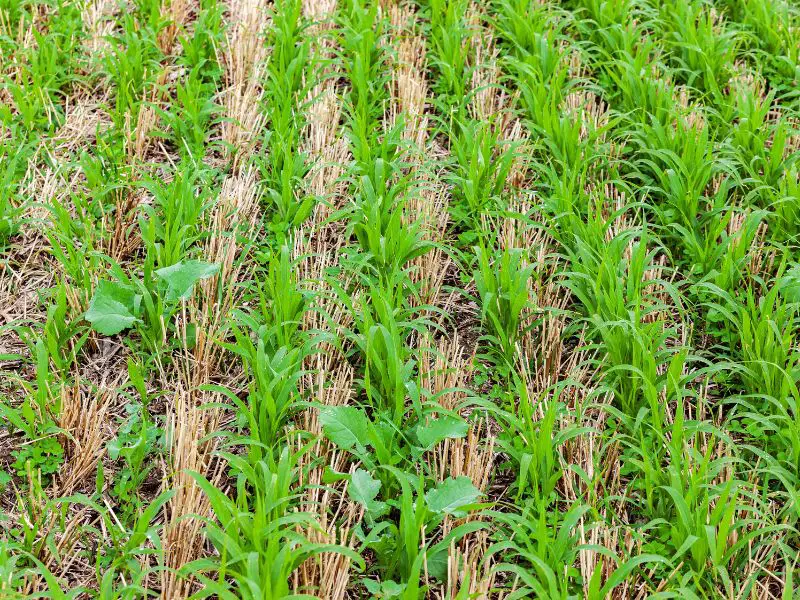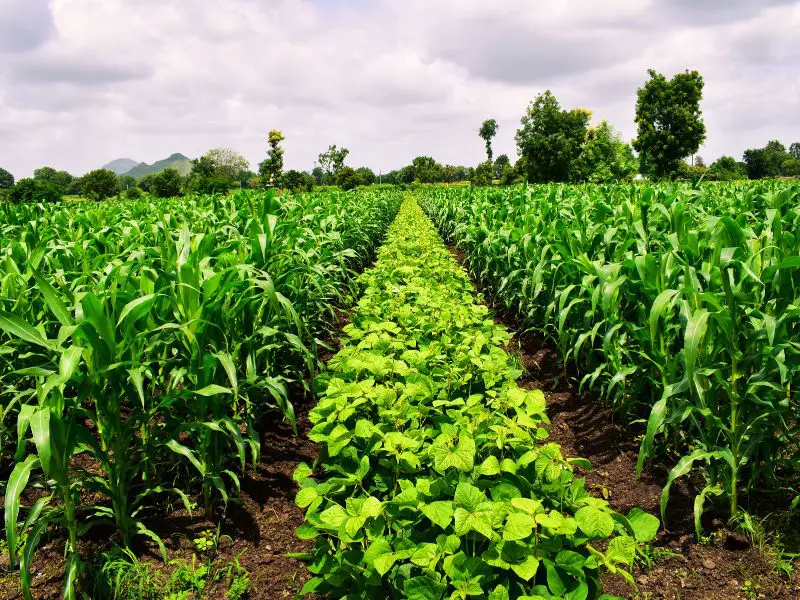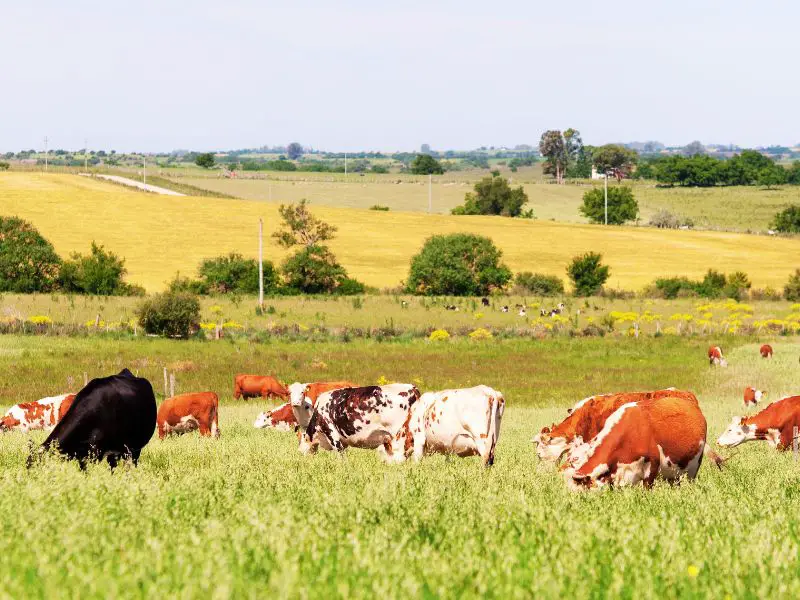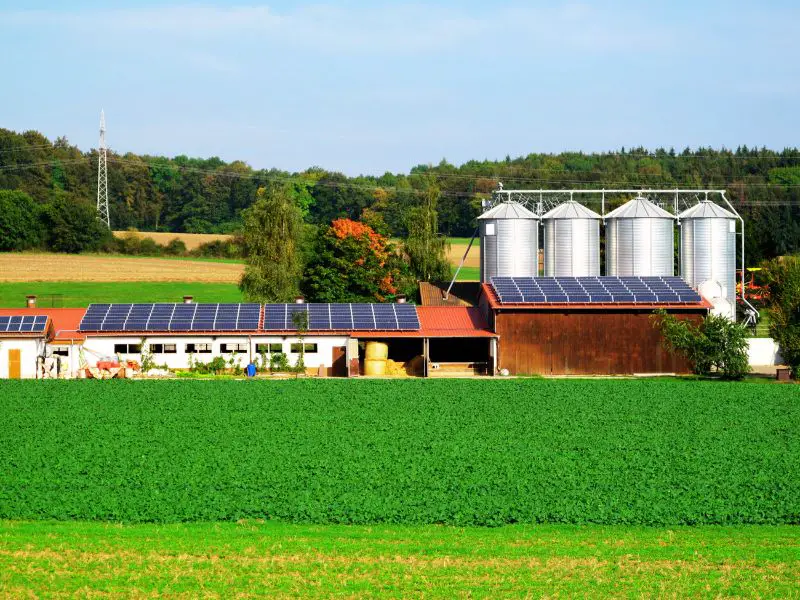As we face a rapidly changing climate and escalating environmental concerns, the “organic farming environmental impact” conversation takes center stage. How does our food’s cultivation influence our planet’s health? Could it be that the seeds we sow, quite literally, are the roots of a sustainable future?
Here we’ll unpack the complex scene of organic farming, breaking down its vibe with the environment, and spotlights how this old-school method might just be the game changer for a greener tomorrow.
Environmental Impact of Organic Farming
Regarding environmental impact, organic farming has several benefits over conventional farming practices. Here are some of the ways that organic agriculture can positively impact the environment:
- Reduced use of synthetic pesticides and fertilizers: Organic farming relies on natural methods of pest and weed control, such as crop rotation, companion planting, and natural predators. This reduces the amount of synthetic pesticides and fertilizers released into the environment, which can harm soil quality, water quality, and wildlife.
- Improved soil quality: Organic farming practices, such as using cover crops and compost, can enhance soil quality by increasing organic matter, improving soil structure, and increasing soil fertility. This can help to reduce erosion, improve water retention, and increase the ability of the soil to support healthy plant growth.
- Reduced greenhouse gas emissions: Organic farming practices, such as crop rotation and avoiding synthetic fertilizers, can help reduce greenhouse gas emissions by increasing soil carbon sequestration. This can help mitigate climate change’s impacts by cutting down the amount of carbon dioxide in the atmosphere.
- Protection of wildlife: Organic farming practices can help protect wildlife by reducing synthetic pesticides and fertilizers, which can affect beneficial insects and other wildlife. Additionally, organic farms often provide habitat for wildlife, such as birds and pollinators, by including hedgerows, wildflowers, and other natural features.
Overall, organic farming can positively impact the environment by reducing synthetic pesticides and fertilizers, improving soil quality, reducing greenhouse gas emissions, and protecting wildlife.
Reduced Soil Erosion

Organic farming practices can help reduce soil erosion, a primary environmental concern. Soil erosion can cause many problems, such as reducing soil fertility, polluting water, and destroying habitats. Here are some ways that organic farming can help reduce soil erosion:
- Crop rotation: Organic farmers often use crop rotation, which involves planting different crops in the same field in different seasons. This reduces soil erosion by limiting the duration of soil exposure to the elements.
- Cover crops: Cover crops are grown specifically to protect the soil. They can help to reduce soil erosion by holding the soil in place and preventing it from being washed away by rain.
- Reduced tillage: Organic farmers often use reduced tillage or no-till methods, disturbing the soil as little as possible. This helps to reduce soil erosion by leaving the soil undisturbed and allowing it to retain its structure and stability.
- Mulching: Mulching involves covering the soil with a slab of organic material such as straw, leaves, or grass clippings. This helps to reduce soil erosion by protecting the soil from wind and rain.
Improved Soil Quality

Organic farming environmental impact is an important topic to consider when talking about agriculture. The practices in organic farming can notably enhance soil quality. Several mechanisms actively achieve this:
- Avoidance of synthetic fertilizers and pesticides: Organic farmers depend on natural techniques to nourish their crops and protect them from pests. This creates a positive effect on the environment and results in healthier soil.
- Increase of soil organic matter: One of the benefits of organic farming is that it amplifies the amount of organic matter in the soil. This consists of decomposed remains of plants and animals, supplying nutrients to crops and improving soil structure. This increase can be achieved using cover crops, crop rotation, and composting.
- Promotion of soil biodiversity: Organic farming practices foster soil biodiversity. Synthetic fertilizers and pesticides may harm beneficial soil organisms such as earthworms and microorganisms. However, organic farmers depend on these creatures to maintain healthy soil. By abstaining from harmful chemicals, they can encourage the growth of beneficial soil organisms, leading to better soil structure and fertility.
- Reduction of soil erosion: Organic farming methods can aid in curbing soil erosion. Cover crops, crop rotation, and reduced tillage can prevent soil from washing or blowing away. This is particularly crucial in regions with sloping land or intense rainfall.
In summary, organic farming environmental impact includes a significant improvement in soil quality. By boosting soil organic matter, promoting biodiversity, and mitigating erosion, organic farmers contribute to establishing healthy, fertile soil that supports the growth of robust crops.
Reduced Water Pollution

Organic farming and its environmental impact can significantly benefit in various ways, particularly in reducing water pollution. These include:
- Chemical-Free Practices: Unlike conventional farming, which typically involves chemical fertilizers and pesticides, organic farming prioritizes natural alternatives. This approach minimizes the risk of harmful chemicals contaminating nearby water sources.
- Soil Erosion Control: Organic farming mitigates water pollution by reducing soil erosion. Cover cropping and crop rotation maintain healthy soil structure and prevent contaminants from washing into water sources.
- Natural Pest Control: Organic farming uses natural pest and disease control methods to reduce dependence on chemical pesticides. These methods include crop rotation, employing beneficial insects, and companion planting, all of which significantly decrease the chances of water contamination.
- Promotion of Natural Fertilizers: Organic farming advocates for using compost and other natural fertilizers. These enhance soil health and reduce the necessity for chemical fertilizers. The latter often leach into water sources, triggering algae blooms and other detrimental effects.
By opting for organic products and endorsing organic farming practices, individuals contribute to reducing water pollution and promoting a healthier environment for everyone. The organic farming environmental impact is indeed vast and considerably positive.
Reduced Greenhouse Gas Emissions

Organic farming practices can significantly contribute to a reduction in greenhouse gas emissions, compared to conventional farming methods, through several ways:
- Avoidance of synthetic fertilizers and pesticides: Organic farmers rely less on fossil fuels and energy-intensive processes, which are typically involved in producing synthetic inputs.
- Promoting soil health and biodiversity: Using organic farming methods nurtures the soil and preserves biodiversity, which can help further reduce emissions.
- Carbon sequestration: Organic farming encourages the build-up of healthy soils rich in organic matter, thus storing significant amounts of carbon in the ground. This pulls carbon from the atmosphere, boosts soil fertility, and enhances water retention.
- Sustainable livestock management: Methods such as rotational and mixed-species grazing employed by organic farmers can reduce emissions from animal waste and methane, a greenhouse gas produced by certain farm animals like cows.
Apart from reducing greenhouse gas emissions, organic farming practices have additional benefits:
- Mitigating effects of climate change: By fostering soil health and biodiversity, organic farming enhances the resilience of agricultural systems to extreme weather events and other climate-related challenges.
Reduced Energy Use

Organic farming practices contribute significantly to energy conservation in several ways, including:
- Reduced reliance on fossil fuels: Choosing to farm organically helps decrease dependence on fossil fuels. Primarily, we use these fuels to manufacture synthetic fertilizers and pesticides. When we eliminate these synthetic inputs, we also remove the energy required for their transportation to the farm.
- Energy-efficient farming methods: Organic farming techniques can decrease energy use on the farm. Key practices include:
- Cover crops improve soil health and fertility, reducing the need for mechanical tillage that consumes fuel.
- Crop rotation and intercropping: These practices decrease the need for irrigation, reducing the energy used to pump water.
- Adoption of renewable energy sources: Organic farming encourages using renewable energy sources like solar panels or wind turbines to generate electricity for farm operations. This lessens reliance on fossil fuels and decreases greenhouse gas emissions.
Energy Avengers Assemble! Unleash your superpowers to save energy at home and discover top-notch Renewable Energy Companies and Nuclear Energy solutions. Join the green revolution and be a hero for our planet!
Reduced Pesticide and Fertilizer Use

Organic farming practices are structured to minimize environmental harm by reducing synthetic pesticides and fertilizers. They achieve this through:
- Employing natural methods to control pests and fertilize crops, thus enabling the production of high-quality crops while lowering environmental impact.
- Integrated Pest Management (IPM) is a primary strategy organic farmers use to lessen pesticide usage. This approach includes:
- Regular monitoring of crops for pests and diseases.
- Utilizing biological, cultural, and physical methods to control pests.
- Implementing measures such as introducing beneficial insects, crop rotation, and physical barriers to prevent pest damage.
- The usage of natural fertilizers like compost and manure to nourish crops. Such fertilizers:
- They are typically less concentrated than synthetic fertilizers, lowering the risk of nutrient runoff and contamination of nearby water sources.
- Organic farmers use cover crops and other methods to enhance soil health and reduce fertilizer dependency.
Organic Farming Environmental Impact Drawbacks
While organic farming has undeniable environmental benefits, it’s essential to consider some drawbacks associated with it:
- Lower Yields: Organic farming typically produces lower yields than conventional farming methods. This could lead to more land being used for farming to achieve similar outputs, affecting natural habitats.
- Resource Intensive: Organic farming often requires more hands-on work and closer attention to the farming process. This labor intensity can increase costs and make organic farming less feasible for some farmers.
- Limited Shelf Life: Organic products often have shorter shelf lives as they need more preservatives typically used in conventionally grown produce. This can cause higher rates of food spoilage and waste.
- Access and Affordability: Organic food is often more expensive than conventionally grown food, making it less accessible for people on a budget. The high cost is because of the intensive labor required and the lower yields.
- Potential for Contamination: While organic farming reduces the use of synthetic pesticides, there can still be a risk of crop contamination. Organic crops can be exposed to soil, water, and air contaminants, such as heavy metals or pollutants from nearby conventional farms.
Each of these factors contributes to the complexities surrounding the organic farming environmental impact, reinforcing the need for a balanced approach to sustainable agriculture.

